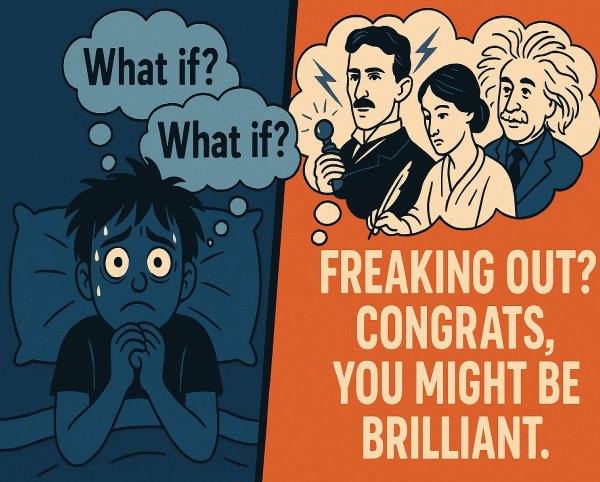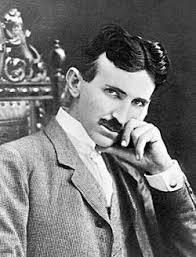Freaking out? Congrats, you might be brilliant

It’s hardly a secret: those who change the world are often nervous wrecks.
This blog is a taste of what’s coming in my book on Visionaries. They’re the ones with the big, wild, world-shifting ideas, and one thing’s for sure. They’re seldom permanently cool, calm, and collected. They sweat, they panic, and second-guess themselves. Some even chew their fingernails down to nothing. Is that you?
How do we know they, and possibly you, are like that? History shows that visionaries behave in ways that are anything but normal. Take Nikola Tesla. Genius? Absolutely. Cool? Not exactly.


Poor Tesla had a strange aversion to round objects — especially pearls — to the point where he couldn’t bear to be in the same room with them.
Yet his fertile, buzzing, anxious brain was exactly what helped him imagine wireless electricity before anyone else had even figured out what a light switch was.
Or Virginia Woolf—brilliant writer, nervous soul. She worried deeply, sometimes to the point of breaking—and I mean breaking. But her anxious, hypersensitive mind gave her the ability to see life in extraordinary, almost X-ray detail.Without her sharp perceptions, modern literature might still sound like dusty old Victorian novels. The trouble is that it all got too much for her, which led to a sad ending.
So what’s the deal? Why are visionaries and anxiety such close friends?
Because visionaries notice everything, that’s what makes them visionary! They see cracks in the system, imagine futures no one else dares to, and ask the questions that make everyone else uncomfortable.
But noticing everything also means worrying about, well… everything. Your brain doesn’t come with an “off” switch.
What often appears to be weakness is really what drives brilliance. An anxious person’s “what if…?” spiral can sound torturous, but it’s also how inventions, novels, and revolutions happen. “What if” can be a world-shattering moment :
- “What if electricity could be something that didn’t have to travel through wires?” → Tesla.
- “What if we wrote novels from inside someone’s head. → Virginia Woolf.
- “What if humans could fly, just like birds? → The Wright brothers, tinkering in a bicycle shop.
- “What if we could talk to someone far away without shouting?” → Alexander Bell hit lucky with a phone.
- “What if we could get people to think differently by using music?” → Bob Dylan starts strumming.
- “What if computers could think?” →Alan Turing, the neurotic founder of what turned into AI.
- “What if the universe doesn’t revolve around us?” → Copernicus, starting a cosmic freak-out.
“What if time and space bend?” → Einstein comes up with a crazy theory that turns out to be true.
So maybe your own late-night “what ifs” count too: What if I fail this test? What if everyone hates my TikTok, my job interview bombs, or my first date is a disaster? Or what if I never figure life out? Sure, those feel stressful.
But channel that same “what if” energy on the bigger picture—What if I start a band? What if I invent something new? What if I actually change the world?—and suddenly you’re right in visionary territory.
Now, let’s get real. Anxiety isn’t glamorous. Tesla literally burned himself out, and Woolf’s struggles ended in a heartbreaking, watery death.
No one’s saying you have to suffer to be great. Mental health is essential, period. But it’s worth remembering: your restless energy, your habit of overthinking, that voice in your head that won’t shut up, can be turned into rocket fuel if you channel them.
So if you’re lying awake at two a.m. worrying about the future? Congratulations. Maybe you’ve just joined the Visionary Club. Want to know the entry requirements?
- A brain that refuses to quit.
- A stomach that keeps doing somersaults before you share your ideas.
- A secret suspicion that you see the world a little differently.
Sound familiar? Then you’re already halfway to being a visionary. The trick is to manage the nerves—through writing things down, exercise, therapy, making memes, whatever works for you, so that they don’t paralyse you.

The people who actually change history are not always chilled. They are more likely to be the ones who shrug and say, “Eh, everything’s cool” They are probably also the anxious ones who mutter, “Something’s wrong here”, and then go and do something about it.
My basic message is don’t beat yourself up for being a worrier. Worry might be the seed of your world-changing idea.
Visionaries don’t just live in the future—they drag the rest of us toward it. I write about them regularly at www.andrewsbooks.site.
Also, don’t miss Conversations with Remarkable Women or the equally diverting Conversations with Marvellous Muses, both on Amazon or at www.andrewsbooks.site.
